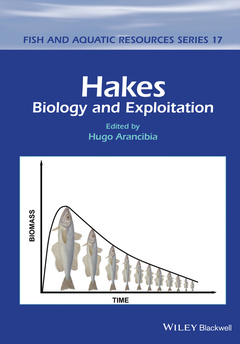Description
Hakes
Biology and Exploitation
Fish and Aquatic Resources Series
Coordinator: Arancibia Hugo
Language: English
Subject for Hakes:
Keywords
Hake, Merluccius, Hoki, Macruronus, Biomass, Growth, Mortality, Stock assessment, Products and prices, Markets
376 p. · 17.5x25.2 cm · Hardback
Description
/li>Contents
/li>Biography
/li>
The species of hake, making up the genus Merluccius, are commercially important and currently largely over exploited, with many stocks badly depleted and showing only limited signs of recovery.
From the end of the 1990s, concepts such as sustainability, ecosystem-based approaches to fisheries management, a code for the responsible conduct for fisheries, governance and others have emerged or have been considered by politicians, stakeholders and society. Moreover, new tools for stock assessment have been developed. But many hake stocks of the genus Merluccius show no sign of restoration.
Hakes: Biology and Exploitation brings together a wealth of important information on the biology and exploitation of hake and hoki stocks around the world. Each chapter provides an overview of the fisheries of each species in an ecological and environmental context, looking at stock distribution, characteristics of the environment, life history, reproduction, diet, growth, mortality, pricing and markets of each geographical region and the hake species found there.
With chapters written by regional experts on hake species and included within Wiley-Blackwell?s prestigious Fish and Aquatic Resources Series, Hakes: Biology and Exploitation provides up-to-date and comparative information, including new approaches to fisheries management, for all those involved in fisheries management, aquatic ecology and biological sciences.
List of contributors ix
Preface xvii
Acknowledgement xxi
1 European hake (Merluccius merluccius) in the Northeast Atlantic Ocean 1
Maria Korta, Dorleta García, Marina Santurtún, Nerea Goikoetxea, Eider Andonegi, Hilario Murua, Paula Álvarez, Santiago Cerviño, José Castro and Arantza Murillas
2 Fisheries, ecology and markets of South African hake 38
M. D. Durholtz, L. Singh, T. P. Fairweather, R. W. Leslie, C.D. van der Lingen, C. A. R. Bross, L. Hutchings, R. A. Rademeyer, D. S. Butterworth and A. I. L. Payne
3 Biology and fisheries of the shallow-water hake (Merluccius capensis) and the deep-water hake (Merluccius paradoxus) in Namibia 70
M. R. Wilhelm, C. H. Kirchner, J. P. Roux, A. Jarre, J. A. Iitembu, J. N. Kathena and P. Kainge
4 Southern hake (Merluccius australis) in New Zealand: biology, fisheries and stock assessment 101
Peter L. Horn
5 The biology, fishery and market of Chilean hake (Merluccius gayi gayi) in the Southeastern Pacific Ocean 126
C. Gatica, S. Neira, H. Arancibia and S. Vásquez
6 Biology and fishery of common hake (Merluccius hubbsi) and southern hake (Merluccius australis) around the Falkland/Malvinas Islands on the Patagonian Shelf of the Southwest Atlantic Ocean 154
A. I. Arkhipkin, V. V. Laptikhovsky and A. J. Barton
7 The biology and fishery of hake (Merluccius hubbsi) in the Argentinean–Uruguayan Common Fishing Zone of the Southwestern Atlantic Ocean 185
María Inés Lorenzo and Omar Defeo
8 Biology and fisheries of hake (Merluccius hubbsi) in Brazilian waters, Southwestern Atlantic Ocean 211
André Martins Vaz-dos-Santos and Paulo Ricardo Schwingel
9 Biology, fisheries, assessment and management of Pacific hake (Merluccius productus) 234
Owen S. Hamel, Patrick H. Ressler, Rebecca E. Thomas, Daniel A. Waldeck, Allan C. Hicks, John A. Holmes and Guy W. Fleischer
10 Biology and fisheries of New Zealand hoki (Macruronus novaezelandiae) 263
Mary E. Livingston, Rosemary J. Hurst, Richard L. O’Driscoll, Andy McKenzie, Sira L. Ballara and Peter L. Horn
11 Biology, fishery and products of Chilean hoki (Macruronus novaezelandiae magellanicus) 294
Rubén Alarcún and Hugo Arancibia
12 An overview of hake and hoki fisheries: analysis of biological, fishery and economic indicators 324
Arancibia Hugo, Tony Pitcher and Mary Livingston
Index 341
Hugo Arancibia is Marine Biologist, Titular Professor at the University of Concepcion (Chile), Dr. Rerum Nature from the University of Bremen (Germany) and Diplom in Competence Assessment from the Major University of Santiago (Chile). At present he is Director of the Doctorate Program in Management of Aquatic Living Resources at his university and gives lectures in research and innovation projects, biology of marine exploited populations and others. His fields of interest are R+D in new fishing resources and the use of indicators in fisheries management.
These books may interest you

Atlantic CodA Bio-Ecology 185.98 €

FlatfishesBiology and Exploitation 217.95 €


